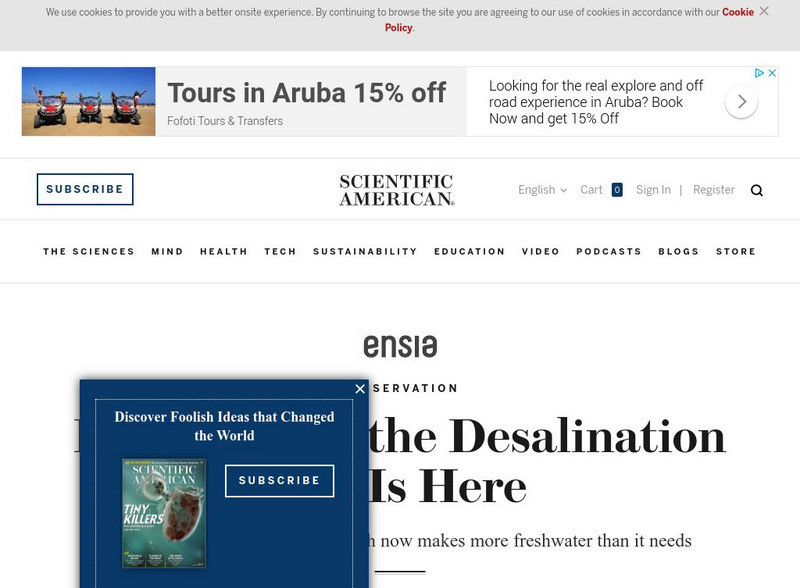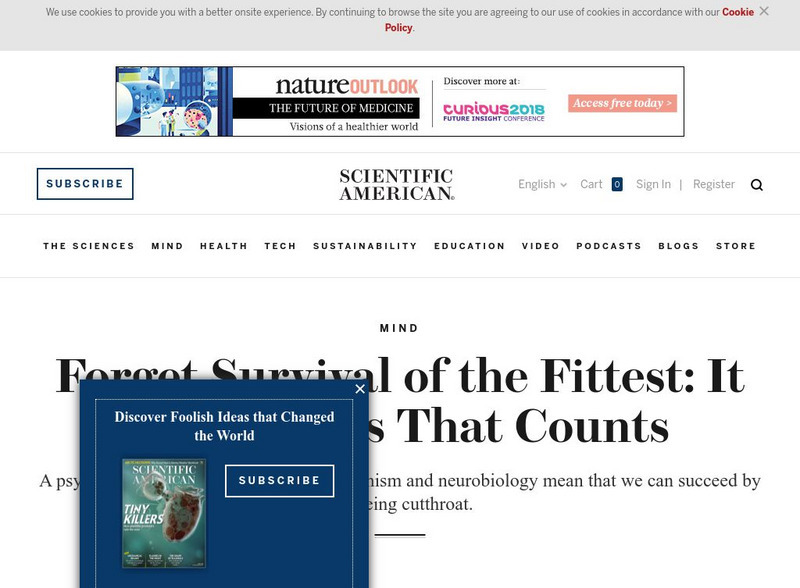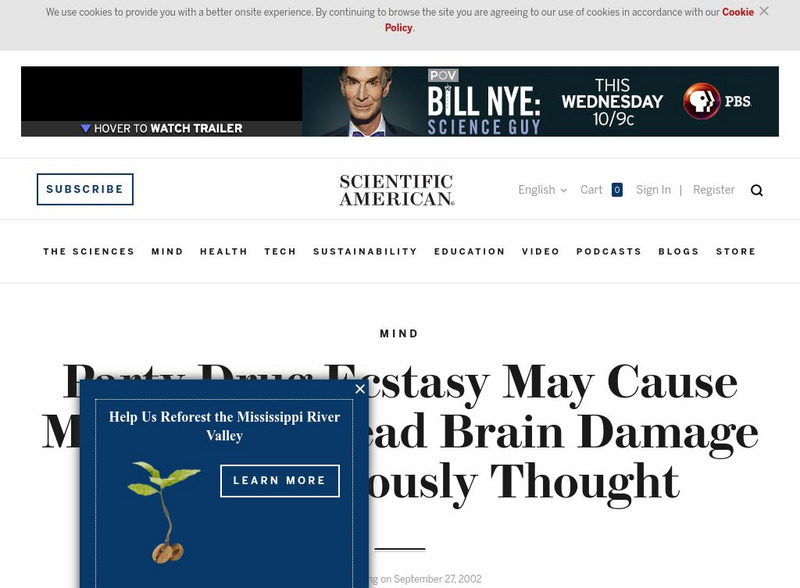Scientific American
Scientific American: Israel Proves the Desalination Era Is Here
Once one of the driest countries on Earth now makes more freshwater than it needs. How can other countries learn what this nation has mastered in an effort to turn droughts around?
Scientific American
Scientific American: The Origin of Oxygen in Earth's Atmosphere
The breathable air we enjoy today originated from tiny organisms, although the details remain lost in geologic time. Scientific American helps uncover this mystery.
Scientific American
Forget Survival of the Fittest: It Is Kindness That Counts
A psychologist probes how altruism, Darwinism, and neurobiology mean that we can succeed by not being cutthroat. Is it possible?
Scientific American
The Strange Case of the Minnesota Iceman
The modern-day corpse of a human-like hominid, preserved in a block of ice, encountered by researchers in the 1960s. Surely the zoological discovery of the century!
Scientific American
Scientific American: Why China Is Dominating the Solar Industry
China has made enormous strides in the national costs of solar energy because of their own solar-electric industry.
Scientific American
Scientific American: Earthquake Proof Engineering for Skyscrapers
Young scholars construct a shake table, then build towers of different heights using Lego blocks, and test their stability on this platform. Next, they test towers with different sized bases, and towers made using different materials.
Scientific American
Scientific American: China, the Olympics, and the Environment
A collection of articles focusing on the environmental issues that existed in China before the 2008 Summer Olympics. Articles target in on air pollution, construction, and cultural issues.
Scientific American
Scientific American: Dna Discloses Iceman's Last Meals
This article, published by Scientific American (September 18, 2002), focuses on new findings which show what Tyrolean Iceman, found in the Italian Alps, ate for his last meal.
Scientific American
Scientific American: Dna Study Traces Fido's Family Tree
This article, published by Scientific American (November 22, 2002), explores new findings tracing the domestic dog's lineage to East Asia.
Scientific American
Scientific American: How Geckos Get a Grip
This article, published by Scientific American (August 27, 2002), explores the latest findings on how geckos cling to surfaces. These findings seem to indicate that small hairs (or setae) in combination with water-based forces allow...
Scientific American
Scientific American: Oil Spills Leave Lasting Mark
This article, published by Scientific American (November 13, 2002), explores the lasting effect of oil spills on the environment.
Scientific American
Scientific American: Ecstasy May Cause More Brain Damage
This article, published by Scientific American (September 27, 2002), explores new evidence which suggests the party drug ecstasy may cause more widespread brain damage than previously thought.
Scientific American
Scientific American: Seal Epidemic Begins Anew
This archived article from Scientific American (July 12, 2002) highlights a devastating disease that is drastically affecting the harbor seal migratory population in the North Sea.
Scientific American
Scientific American: The Intricacies of a Gecko's Grip
This article, published by Scientific American (June 19, 2000), explores how geckos hang on vertical surfaces. They don't use glue, or suction, or even nature's version of Velcro. Instead, they utilize intermolecular forces "to get a...
Scientific American
Scientific American: You Snooze, You Win
This article, published by Scientific American (July 3, 2002), highlights new research which indicates that morning sleep and afternoon naps aid mental and physical learning.
Scientific American
Scientific American: Smart People Believe Weird Things
This article, published by Scientific American (September 2002), explores how smart people can believe weird and silly things. The article comes to the conclusion that our beliefs are shaped more by our environment than our understanding...
Scientific American
Scientific American: Einstein's Hot Time
This article, published by Scientific American (September 2002), re-publishes a short paper by Albert Einstein which "explains" relativity to the layman the pretty girl/hot stove abstract.
Scientific American
Scientific American: Controlling Robots With the Mind
This seven-page article, published by Scientific American, explores how people may someday command wheelchairs and prosthetic devices by "thinking them through" the motions.
Scientific American
Scientific American: A Promenade With Prosimians
This article, published by Scientific American (September 2002), takes a look at the lemurs and their next of kin at the Duke Primate Center.
Scientific American
Scientific American: Harness Hydrogen Fuel From Plants
This article, published by Scientific American (August 29, 2002), explores the successful manufacturing of hydrogen from a glucose solution derived from biomass. Such a fuel source, if proven practical, could easily power hydrogen...





















